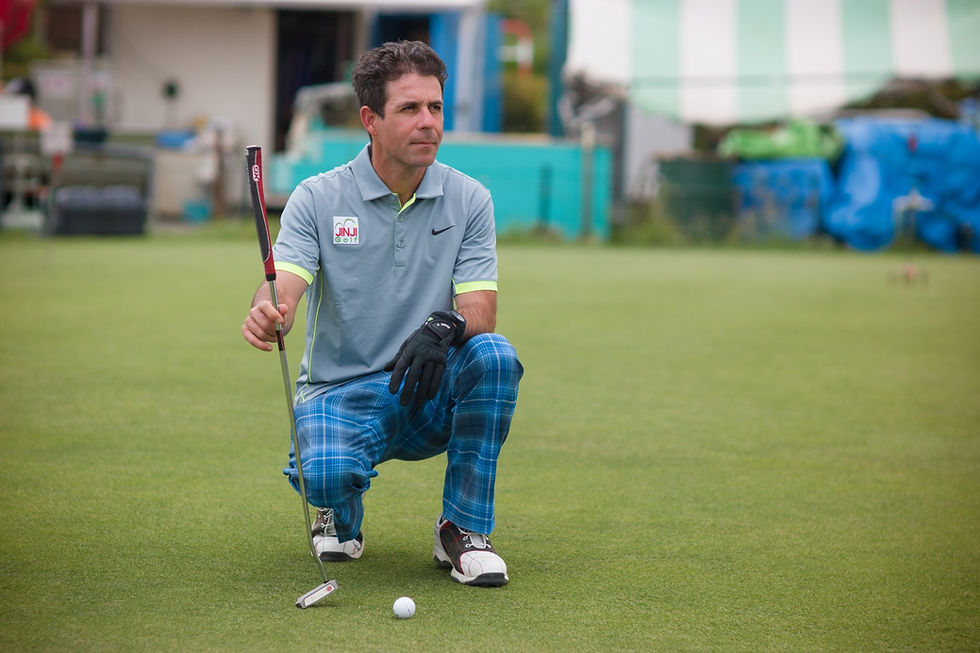Healthy Benefits of Playing Golf - You Need to Know
- JINJI GOLF CENTER

- Dec 17, 2019
- 3 min read
Updated: Mar 7, 2021
Golf is a very popular sport worldwide. It is a game played on a large outdoor course, the object being to propel a small hard ball into a series of ‘holes’ with as few strokes as possible, using a variety of wood or iron-tipped sticks or ‘golf clubs’. In 2005, it was calculated that there were nearly 32,000 golf courses in the world, providing many opportunities to participate.
Golf provides a stimulating mental challenge combined with a healthy walk in pleasant surroundings and can be played by people of all abilities and ages. Golf can be played on your own or in a team. It may be a casual pastime or a competitive activity.
Health benefits of golf
Golf can be good for your health and your heart. Walking an average course for a round of golf can be between five to seven kilometres. If you walk 18 holes three to five times a week, you’ll get an optimal amount of endurance exercise for your heart. If you pull your clubs or carry them, you’ll burn even more calories each round and benefit even more.
Playing golf regularly can help you:stay fit improve muscle tone and endurance lose weight and body fat.

Other benefits of golf
Golf can also:be a great way to keep in touch with friends help in reducing stress (as a result of the physical activity and also due to the pleasure of walking in an open and natural environment)provide opportunities to meet new people help develop a sense of community connectedness.
Starting to play golf
Golf can be a very social and enjoyable sport. While you compete against others, you can also compete with yourself to better your previous best score.
A good way to get started is to take lessons to acquire the fundamental skills before hitting the course. Alternatively, you could gather a group of friends, hire some clubs and make your way around your local public course, which can be equally as enjoyable. As you improve, you may consider purchasing a set of clubs and, if you are really keen, you may have the clubs custom-made to suit you.

Preventing golfing injuries
Golf is a leisurely sport and, compared to other sports, the overall risk of injury is low. However, injuries still can and do occur. Common injuries are to the lower back, wrist and elbow, head and eye. Causes of injury include overuse, incorrect technique, hitting the ground instead of the ball, and aggravation of a previous injury.
Some tips to avoid injuries include:
Warm up and stretch before playing, paying particular attention to your back, shoulders and arms. Include gentle movement and mobility exercises followed by gentle air swings or ball hits using short irons (a type of golf club).Take lessons. Good technique is your best defence against injuries.Stand at least four club lengths away from a swinging club. Stand behind a swing in progress in your group.Use good equipment including shoes, socks, gloves and clothing.
Have golf equipment professionally fitted before purchase.Wear sun protection (clothing, hat, sunglasses and 30+ sunscreen) between September and April where heat and UV is at its highest.Drink water before, during and after a game.Know and practise the basic rules and etiquette of the game. Check that no one else is standing close by before you swing. Don’t play until the group in front is out of the way. Shout ‘fore’ to warn of danger to players and spectators. Give way to ground staff and wait until they call you to play on.Lift and carry clubs safely and, when necessary, use a buggy.In times of extreme heat, you may need to reconsider the playing conditions for further play. Consider playing in the early morning or twilight to avoid the hottest period of the day.Stop playing immediately when an injury occurs.Seek first aid or prompt medical treatment for any type of injury, irrespective of how severe it is.




Comments